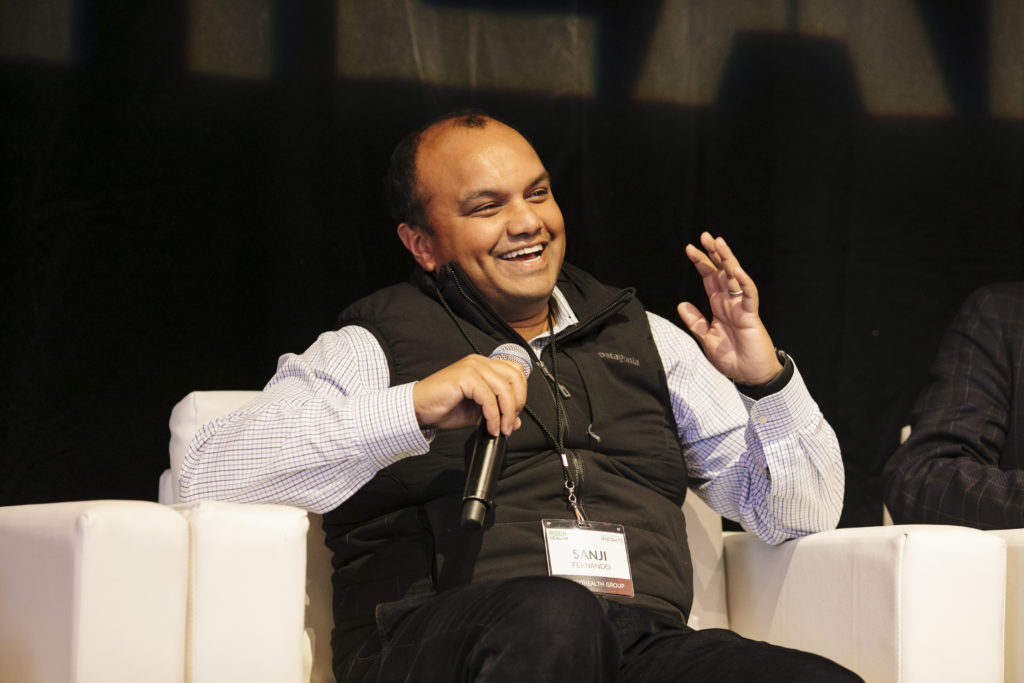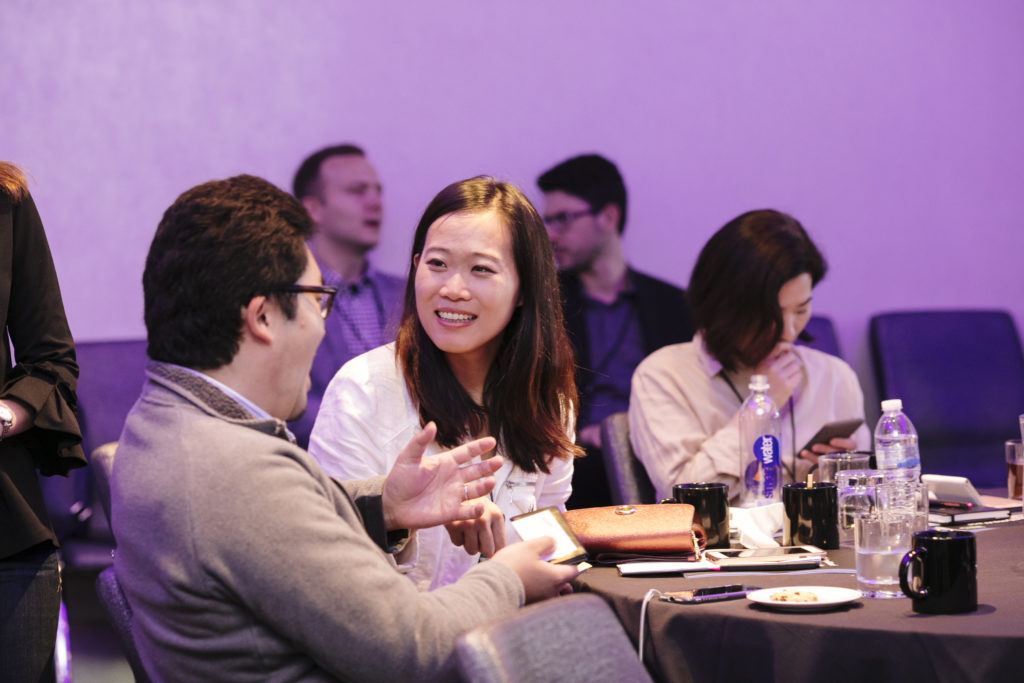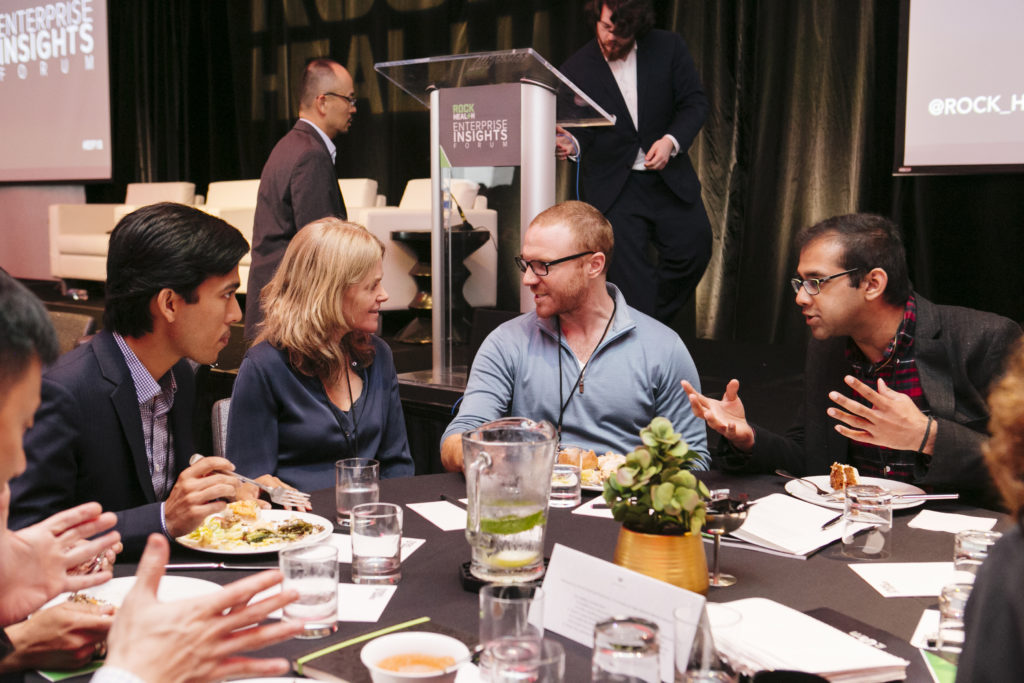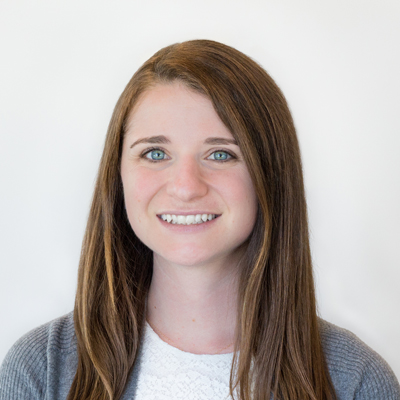Five things we learned from industry leaders about AI in healthcare
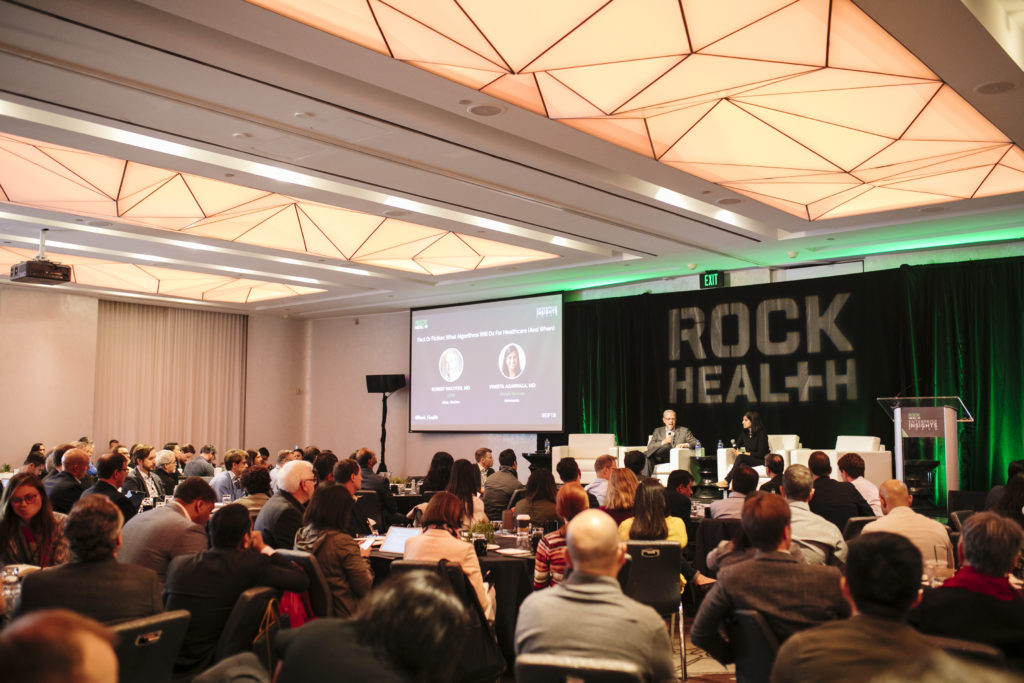
Two weeks ago, we brought together over 200 decision makers from enterprise, academia, venture, and startups for the inaugural Enterprise Insights Forum. Powered by Rock Health’s research and community, this year’s event explored and delivered actionable insights to industry leaders around AI and machine learning, building off findings from our whitepaper on the topic.
While the event itself is invite-only, some tidbits were too good not to share. In our latest podcast episode, we recount the opening session of the day with Professor and Chair of the Department of Medicine at UCSF, Dr. Bob Wachter, and Google Ventures partner and physician-scientist Dr. Vineeta Agarwala exploring what algorithms will do for healthcare—and when. Read on for five key themes and takeaways from three of the day’s sessions about enterprise adoption of AI-driven innovation.
We’re in the relatively early days of digital data in healthcare—but consumers are increasingly expecting the same convenience, access, and quality in healthcare that digitization affords in other areas of their lives.
- Wachter suggested digitization in healthcare is still in its early stages of development: “The biggest thing that’s happened in digitization is we’ve gone from 10% electronic health record adoption ten years ago to 90 or 95% today. But it’s important to recognize how early we are in that transformative phase.”
- We’re in a moment where those delivering care—from physician practices to health systems—are under pressure “to figure out how to deliver high quality, safe, satisfying, equitable, accessible care at the lowest cost.” Wachter feels this pressure is fueling the “uptick in digital” across healthcare.
- Echoing this sentiment, Sanji Fernando, head of the OptumLabs Center for Applied Data Science, reminded the audience to consider the driving force of healthcare’s rapid consumerization. “The consumer is learning to expect more, because they are getting great capability from Yelp, or from Uber, or from Lyft—and that’s going to put a lot of pressure on all of us in healthcare to think about serving consumers the way they’re served by other industries.”
Because of its appetite for big data sets, AI has a unique ability to break down data silos and encourage multidisciplinary partnerships across the ecosystem.
- Kay Eron, VP & GM at Philips Neuro, leads a team applying computer science and AI to empower clinicians and researchers. Despite an ongoing industry trend of consolidation, Eron predicted there won’t be “one organization who will conquer all of healthcare.” In fact, she reminded the audience that transformation will likely come from each company understanding its strengths, and identifying where it can add value, in partnership with others, to the ecosystem.
- Wachter emphasized the shift to digital records creates more opportunities for partnerships and data sharing. Agarwala added data-sharing becomes a necessity with AI. “AI is uniquely capable of forcing data silos to break down and forcing large institutions, which have historically had legitimate fears about data-sharing, to finally see a source of self-interest in it.” Health systems and others will need to seek cross-system data sets since training an algorithm on data from their patient population is likely insufficient (and doesn’t unlock the power of a larger, more diverse data set).
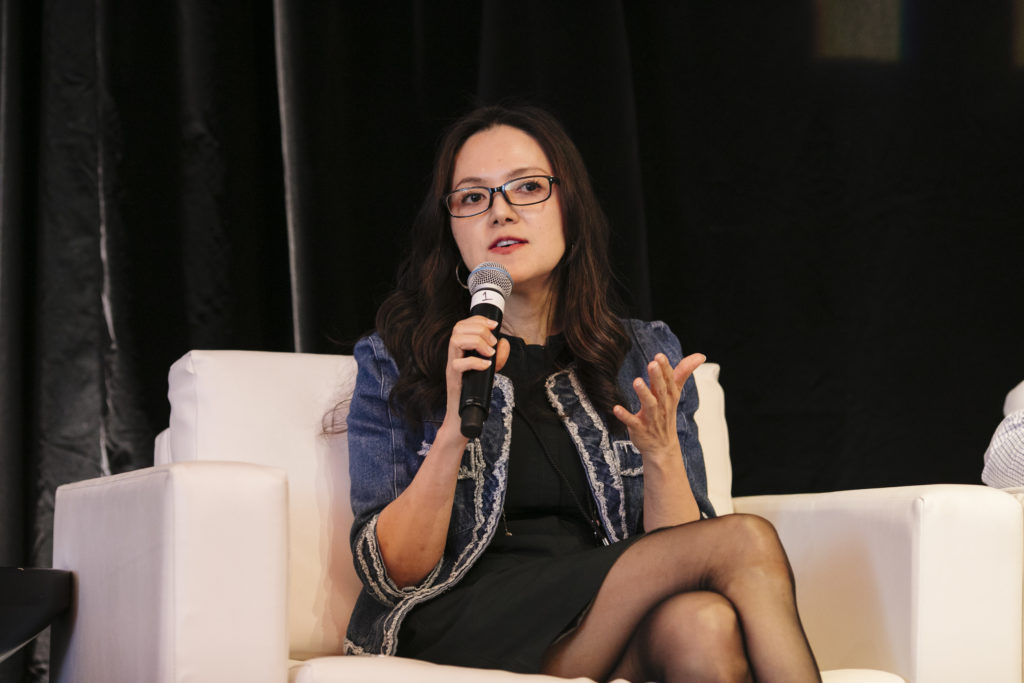
Build AI-powered innovations with empathy for the user—for instance, solutions that scale provider expertise and address physician burnout.
- Wachter highlighted the skyrocketing rate of physician burnout, powered in part by the amount of data entry required on the job. This, he feels, is where AI can help: “It allows the doctor to pay attention to the human element, the things we do better than computers.” In the short term, Wachter believes AI use cases supporting the provider workflow, such as digital scribes, are more likely to come to fruition.
- Todd Pierce, a board member at Dignity Health and Rock Health, encouraged leaders to leverage AI to solve problems that have a real human impact: “Improving outcomes, using the workforce more effectively, improving working conditions, making the experience more enjoyable, returning a sense of purpose, mastery, and autonomy—I think those are all the things we should be striving for. As I look at the demand, there is plenty of opportunity there.”
- Wachter stressed that “every single thing has integration challenges.” There will inevitably be conflict if and when AI enables the government or payers to “look over the shoulder of MDs” and suggest (or even dictate) how doctors should deliver care. Wachter reinforced that successful organizations will ensure decision support tools are a value-add—not a threat—to clinical practice.
- Agarwala added, “AI has a huge near-term role in better allocating scarce specialty resources across the healthcare system,” citing diagnostic radiology as an example.
It’s not magic—just math: Enterprises should treat AI as another tool to optimize decision-making and operations.
- Eron encouraged the audience to remember, “AI is just another tool that came along—it is a powerful one, but we have to treat it like a tool.” In a sentiment echoed by many throughout the day, she emphasized that healthcare will still very much require human judgement—something machine learning algorithms simply can’t replace.
- Asked to provide advice to enterprise on assembling an effective team to tackle evaluation, adoption, and integration of AI/ML technologies, Fernando shared, “it’s not about hiring an army of AI engineers and specialists, but generating and building a multidisciplinary approach to artificial intelligence.”
It’s naive to think the most impactful innovation in AI/ML will happen within the confines of the Silicon Valley bubble—or from industry incumbents working on their own.
- Wachter told his captive Bay Area audience, “the future of AI and digital transformation will not be created in Mountain View or Cupertino. They simply do not and cannot know enough about the way the healthcare system works. Nor will it be created at UCSF, because we don’t have the business expertise or scale.” Such transformation, he said, will only occur with partnerships.
- Beyond academic, enterprise, and startup collaboration, Fernando noted, “markets like China and India, maybe Asia and Africa, are going to come up with new ways to deliver high quality care that we will import into the US—and that might be the biggest disruption.” Eron elaborated on this, saying foreign markets have fewer regulations and thus might have access to more, diverse data sets to train algorithms.
- Addressing an audience comprised primarily of enterprise leaders, investor Vinod Khosla noted the lack of innovation he’s seen from industry incumbents: “Is there one area in the last 30 years where the initial innovation was driven by an institution of any sort? I couldn’t think of a single area where innovation—large innovation—came from a big institution. Retailing wasn’t disrupted by Walmart, it was by Amazon. Media wasn’t changed by CBS or NBC, it was by YouTube and Twitter. Cars weren’t transformed by Volkswagen and GM—and people said you can’t do cars in startups—but then came Tesla.”
- Pierce shared his view that “never before in human history has it been cheaper or easier to develop an innovation—certainly in software.” But the adoption of these new innovations hasn’t been seamless. He pleaded with fellow enterprise leaders in the room to adopt and scale innovation more quickly, or “we are going to kill the ecosystem.”
- Khosla also emphasized the importance of enterprise as the “buy-side” of the market: “Most innovation is not predictable, but it is discoverable. This is why startups do it well, because they constantly change plans. But in almost all cases, the large institutions get involved (after the risk was removed) to leverage, deploy, and scale the innovation.”
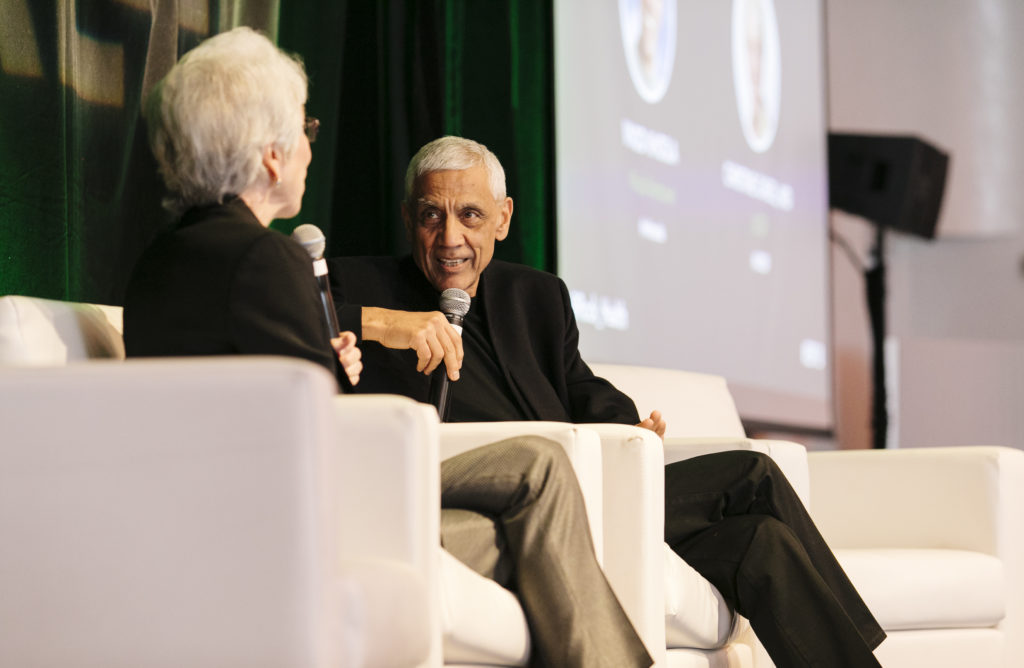
Given the day’s focus on partnerships and collaboration across healthcare, we are grateful for the opportunity to connect our industry partners with other enterprise leaders, startups, investors, and academics throughout the ecosystem. Send us a note if you’re interested in learning more about becoming a Rock Health partner.
Come one, come all: Tickets for our seventh Rock Health Summit are now up for grabs—get your early bird ticket before they’re all gone.
